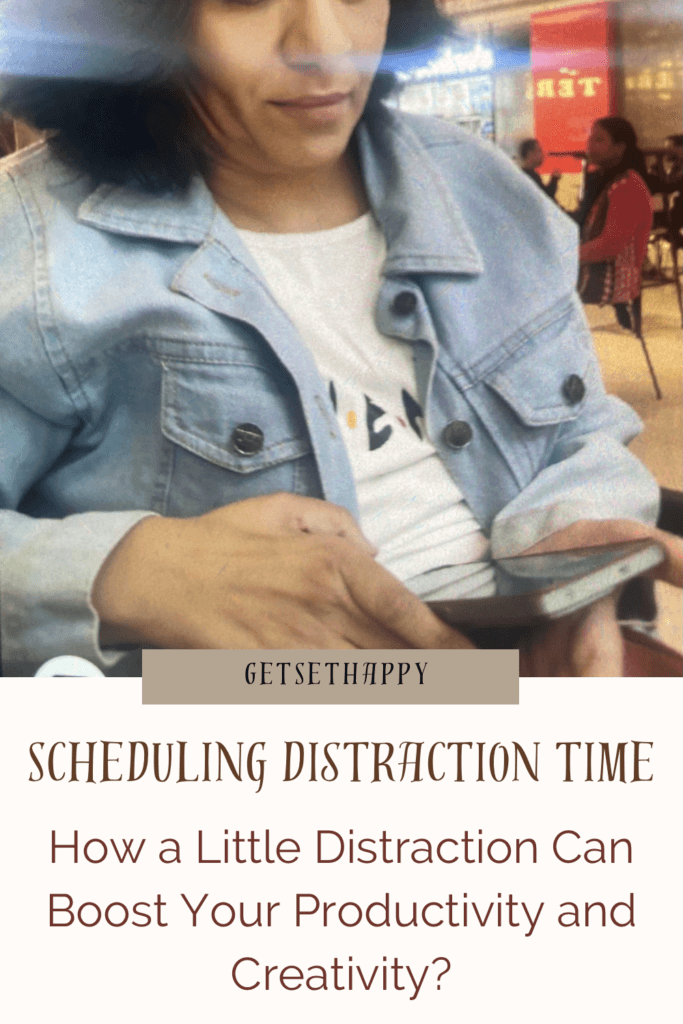Recently, in one of the posts by Ankur Warikoo, I read about Scheduling Distraction Time. The idea clicked my mind and I decided to give it a try. After one month of religiously acting upon it, here is what I found:
While it may seem counterintuitive, there are some benefits to distraction: Scheduling distraction time can have several benefits, including:
1. Increased productivity
When you schedule distraction time, you can focus better during your work or study time. Knowing that you have set aside specific time for distractions can help you resist the urge to check social media or respond to messages during your work hours.
2. Improved Time Management
Distraction time can help you manage your time better by allowing you to plan and prioritize your work activities. By setting aside a specific time for distractions, you can create a better balance between work and play.
3. Reduced stress
By knowing that you have set aside time for activities that you enjoy, you can reduce stress levels and feel more relaxed during your work or study time. This can help you to be more productive and efficient during your work hours.

4. Better Mental Health
Scheduling distraction time can help to improve your mental health by giving you time to engage in activities that you enjoy, such as hobbies, exercise, or spending time with loved ones. This can help to boost your mood and reduce the risk of burnout.
5. Improved Creativity
Sometimes, when we step away from a problem or task that we are working on, we are able to come up with new ideas or solutions. This is because our brains have had a chance to rest and process information in the background. Taking a break to do something different, like going for a walk or chatting with a colleague, can help to stimulate creativity.
6. Enhanced Learning
A brief distraction can sometimes help to improve learning and retention of information. For example, taking a break during a study session to do a different type of task, like drawing or playing a game, can help to refresh the brain and make it easier to absorb new information.
7. Improved Mood
Distraction can sometimes improve our mood by helping us to focus on something positive or enjoyable. For example, watching a funny video or spending time with a loved one can help to boost our mood and make us feel better.
Wrapping Up on Scheduling Distraction Time
Overall, scheduling distraction time can help you to be more productive, manage your time better, reduce stress, and improve your mental health.
Although, distraction can have some benefits, particularly if it is used deliberately and intentionally. However, it is important to balance distraction with focus and productivity to ensure that we are making progress towards our goals.

Featured Image by Freepik





9 Comments
Julie Russell
May 10, 2023 at 11:25 pmGreat insight into scheduling distraction time! Sometimes we just need a break. I look forward to reading more articles!
Tan Kok Leong
May 15, 2023 at 8:45 pmThanks for sharing ☺️
Julie
May 16, 2023 at 7:43 amThis requires some discipline for sure; its a neat way to think about it!!
Valentina
September 5, 2023 at 1:58 amSometimes I have issues being productive but with a little distraction I find out that my mood improves and I get creative.
Pedja
May 30, 2023 at 12:46 pmSo true! Little quality distraction time can act as a good resting time after which you can boost your productivity. I never spend it on a phone though.
Michelle Jenkins
August 2, 2023 at 7:57 pmFor someone who struggles with being productive, this is very helpful!
Jenna from Heavenly Spiced
September 4, 2023 at 11:52 amStopping by to say hello! I love this idea of scheduled distraction time. The benefits certainly make me want to give it a try!
Alina marie DiPalma
September 4, 2023 at 11:45 pmThis article is absolute genius! I usually schedule my day to avoid any distractions to increase productivity and its mind blowing to find out I’ve been doing it all wrong and to welcome a few distractions during my day. No wonder why I’ve been extra stressed lately
Lisa Evelyn McGrath
September 5, 2023 at 8:19 amInteresting post, it does make sense; I think it gives the conscious mind a break, allowing the subconscious to play around with ideas and dot connect. So Awesome!! Thanks!!